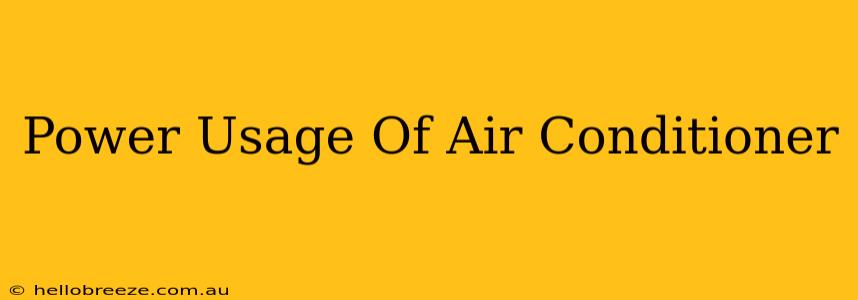Air conditioners are essential for maintaining comfort, especially during scorching summer months. However, understanding their power consumption is crucial for managing energy costs and making informed decisions. This comprehensive guide delves into the power usage of air conditioners, exploring factors influencing energy consumption and providing tips for efficient use.
Understanding Air Conditioner Power Consumption
The power consumption of an air conditioner is measured in watts (W) or kilowatts (kW). A higher wattage generally indicates a more powerful unit capable of cooling larger spaces quickly. However, this also translates to higher energy consumption and electricity bills.
Several factors determine an air conditioner's power usage:
1. Size and Type of Air Conditioner:
- Window units: These are generally less powerful and consume less energy than larger central systems.
- Portable units: Similar to window units, these consume relatively less energy. Efficiency varies greatly depending on the model.
- Central air conditioners: These systems cool entire homes and typically consume more energy due to their larger capacity. They often include features like variable-speed compressors for greater efficiency.
- Split-system units: These consist of an outdoor unit and an indoor unit, offering improved efficiency compared to older single-unit systems. Inverter technology in these systems is becoming increasingly common, allowing for even more energy savings.
2. SEER Rating:
The Seasonal Energy Efficiency Ratio (SEER) measures an air conditioner's cooling efficiency. A higher SEER rating indicates greater efficiency and lower energy consumption. Look for units with high SEER ratings to save money on electricity bills. The higher the SEER rating, the less energy your air conditioner will use to produce the same amount of cooling.
3. EER Rating:
Energy Efficiency Ratio (EER) is a measure of an air conditioner's energy efficiency at a specific outdoor temperature. While SEER is a better overall indicator of annual efficiency, EER provides a useful snapshot of performance under particular conditions.
4. Usage Habits:
- Temperature settings: Setting the thermostat even a few degrees higher can significantly reduce energy consumption.
- Run time: Longer run times naturally lead to higher energy use.
- Maintenance: Regularly cleaning filters and coils improves efficiency.
5. Climate and Insulation:
- Climate: Hotter climates require air conditioners to work harder, resulting in increased power usage.
- Insulation: Well-insulated homes require less cooling, lowering energy consumption. Proper sealing around windows and doors further reduces the load on your AC unit.
Calculating Your Air Conditioner's Power Consumption
While the exact power consumption varies depending on the above factors, you can estimate it using the following formula:
Kilowatt-hours (kWh) = (Wattage/1000) x Hours of use
For example, a 1500-watt air conditioner running for 8 hours will consume:
(1500/1000) x 8 = 12 kWh
You can then use your electricity provider's rate to calculate the cost of running the air conditioner.
Tips for Reducing Air Conditioner Power Usage
- Regular maintenance: Clean or replace air filters regularly. Schedule professional maintenance annually to ensure optimal efficiency.
- Proper insulation: Improve your home's insulation to reduce the cooling load.
- Strategic window treatments: Use curtains, blinds, or shades to block sunlight and reduce heat gain.
- Smart thermostats: Smart thermostats can learn your habits and automatically adjust temperatures to optimize energy use.
- Ceiling fans: Use ceiling fans to improve air circulation and reduce the need for air conditioning.
- Energy-efficient appliances: Use energy-efficient appliances throughout your home to reduce overall energy consumption.
Conclusion
Understanding the power usage of your air conditioner is essential for both environmental responsibility and financial management. By considering the factors discussed above and adopting energy-saving strategies, you can minimize your air conditioner's energy consumption and significantly reduce your electricity bills, while maintaining a comfortable living environment. Remember to always consult professional HVAC technicians for advice specific to your needs and equipment.

